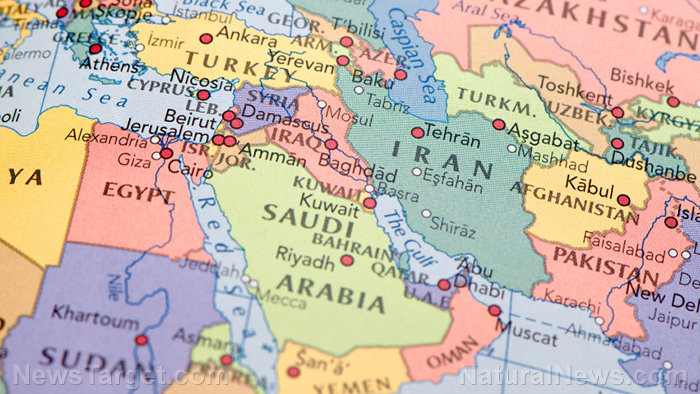China strengthening ties in the Middle East while attempting to undermine British and American influence in the region
02/26/2024 / By Richard Brown

Experienced security analyst Barak Seener has warned that China is attempting to consolidate its influence in the Middle East.
Seener’s assessment is grounded in the observation that China’s sway in the region has markedly increased, particularly in the aftermath of significant events such as the Israel-Hamas conflict and the Red Sea attacks masterminded by Iran-backed Houthi rebels.
The expert said China is actively working to erode the influence traditionally held by the U.K. and the U.S. in the Middle East, with a clear ambition of becoming the preeminent decision-maker in the region. (Related: China is using the Israel-Palestine conflict to sideline the U.S. on the international stage.)
Being a primary source of the oil crucial to China’s needs, Seener noted that the Middle East is integral to Xi’s ambitious infrastructure projects designed to extend the communist nation’s influence globally.
China using economic leverage to secure its interests in the Middle East
He pointed to China’s calculated efforts in utilizing economic leverage and diplomatic prowess to secure geopolitical interests, especially following the Israel-Hamas war and the Red Sea incidents.
A crucial aspect of China’s strategy, as outlined by Seener, is its alignment of interests with Tehran, particularly in weakening the long-term influence of the U.K. and the U.S. in the Middle East.
The geopolitical landscape witnessed a significant shift when Arab and Muslim ministers chose Beijing as their initial destination to meet all five permanent members of the United Nations Security Council last November, underscoring the growing role that China has acquired in ongoing Middle East affairs.
Seener stressed the need for the U.K. and the U.S. to counterbalance China’s escalating influence by signing on to the 2020 Abraham Accords, a diplomatic initiative that brokered peace and normalization of relations between Israel and the United Arab Emirates, Bahrain, Morocco and Sudan. Seener argued that the Accords are pivotal in preventing China from becoming the predominant power in the Middle East.
Highlighting the intricacies of the Abraham Accords, Seener pointed out that the threads tying these agreements together have come under strain, particularly since the beginning of Israel’s military campaign in Gaza. The Arab world has grown increasingly discontented over Israel’s actions. The conflict has even hindered plans for Saudi Arabia to join the Accords and normalize relations with Israel, potentially complicating the delicate balance of power in the region.
Seener further warned about the possible repercussions for the U.K. and the U.S. if China continues to expand its influence in the Middle East. Increasing economic ties between China and the region’s nations may necessitate a larger Chinese military presence to safeguard these interests. Such a move could end up cutting off Western powers from the region.
As China extends its reach in the Middle East, exemplified by its naval presence in the Gulf of Aden and the funding of a military base near Abu Dhabi, Seener emphasized the need for the U.K. to actively engage in the region to ensure stability.
Watch this clip of China at the International Court of Justice supporting Palestinians in defiance of the West.
This video is from the Cynthia’s Pursuit of Truth channel on Brighteon.com.
More related stories:
Sources include:
Submit a correction >>
Tagged Under:
Abraham Accords, big government, China, foreign relations, geopolitics, Israel, Middle East, national security, politics, propaganda, United Kingdom, US, Xi Jinping
This article may contain statements that reflect the opinion of the author
RECENT NEWS & ARTICLES
COPYRIGHT © 2017 CHAOS NEWS




















